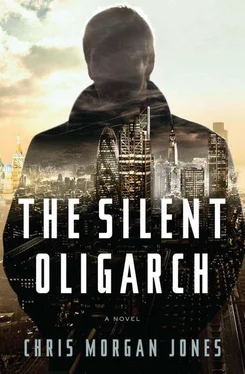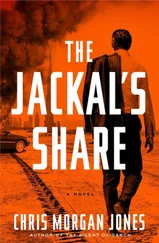Malin followed Lock into the sitting room.
“Can I get you a drink?” said Lock.
“No, thank you.”
“Please, have a seat.”
Malin sat in the one armchair, where Lock usually sat when he was watching television. The room was sparsely decorated; this was not a home. Lock sat on the sofa and tried to appear relaxed.
For a second or two Malin simply looked at Lock, and Lock as ever was at a loss to read his face. It held no expression. The eyes were blank and sharp at once. Had they always been like that? Were these the eyes that slowly seduced me so long ago?
“How was Paris?” Malin said at last.
“Not as good as it could have been. No doubt you’ve heard.”
Malin nodded. A slow nod, three times, looking at Lock all the while. Then he took a long deliberate breath, let it out through his nose, and reached into his jacket pocket for his cigarettes, a Russian brand. He took one from its soft pack and lit it with a plastic lighter, letting all the smoke leave his lungs before talking.
“I thought Kesler coached you.”
“He did.”
“Then it was your fault?”
Lock didn’t reply. He tried to hold Malin’s look. Malin watched him and smoked. He tapped his ash, curling it into the ashtray, and spoke again.
“Do you think it likely, Richard, that the largest foreign investor in Russia’s oil industry would not know the difference between kerosene and gasoline?”
“I didn’t… I’m just the shareholder.”
“Or the standard terms of an oil exploration license?”
Lock looked down at his shoes. Malin went on.
“Or the combined revenue of the group over the last ten years?”
Lock could feel a sharp, constricting pain in his breastbone. There was a stagnant smell about him. He wanted to take a shower.
Malin was still looking at him.
“I’m sorry.” It was all he could find to say.
Malin stubbed out his cigarette, separating the burning ember from the filter, his eyes held on Lock.
“You have had too much international exposure, I think.” Malin sat hunched forward like a frog, his thick shoulders sloping. “Things are difficult. There are stories in the newspaper and the lawsuit goes on. Tourna’s people are more and more aggressive. They will put pressure on you, and I do not want any harm to come to you.” He paused. “You are too important to me.” This seemed to demand a response but Lock waited. “This is why I have arranged for new bodyguards for you. These men are good. They will make sure that you are looked after. They will make sure that no one gets to you.”
Lock tried to think of something to say. “What about Andrei?” was all that he could manage.
“He has been reassigned.” Malin shifted forward in the chair. “Is there anything else you need to ask me?”
“Will I… Can I come and go as I please?”
“Of course. It is exactly as before.”
“How long will this last?”
“Not long. It is a temporary measure. When things have died down we can go back to normal.” Lock felt himself being scanned and at the same time being told something: don’t underestimate how serious this is.
Malin Stood up and held out his hand. Lock took it.
“Good-bye, Richard. I will see you at the ministry on Monday.”
“Yes. Good night.”
Malin let himself out. Lock was left in his sitting room, wondering. He wondered about many things, but what troubled him the most was what hadn’t been said. No mention of the investigation into Tourna. No steely pep talk. Almost as if he didn’t matter anymore.
MALIN WAS RIGHT: it was exactly as it was before. Lock was surprised by how little difference it made to his life to have an armed guard watching over him. He went to the office, he had dinner, he came home, he had a solitary and dreary weekend. Liberty would have been wasted on him.
His guard changed at nine each night. He knew that every movement he made was noted and reported, and he knew, though it was unspoken, that he couldn’t leave the country, or flit to St. Petersburg for the weekend. But that wasn’t so different either. For years now he had lived at the permission of someone else. Now he knew it. That was all.
What was different was Oksana’s absence. For a week after his return from Paris he had tried to live a simple life and ignore the weight he felt on him every morning when he woke, but any setback, any reminder of his plight and he found himself wanting to see her. More than anything else he wanted to talk to someone who didn’t occupy his world. He chided himself for his weakness but it made him no stronger.
And then there was Marina, and the letter. He had taken to carrying it with him in his inside pocket, where it felt at once like a comfort and a risk: after all, if anyone were to read it they would surely conclude that he was now on the verge of defecting, or of simply breaking down. He didn’t know why he kept it with him. He told himself that she was right in her analysis but wrong, or unrealistic, in her prescription, and so her words didn’t serve as inspiration, or guide, or spur (there ought to be spur enough in finding a guard outside his apartment door each morning, as certain as the sun). But they stayed with him nevertheless, on his person and circling in his head, perhaps because what they said most clearly was that she still cared for him, that in some other universe where his confinement was not as close or as total there might yet be hope.
THE PAPERS WERE ALIVE AGAIN. The Wall Street Journal had published a profile of Malin that, while it mentioned his official achievements, was not flattering. “Russia’s Secret Oligarch” was the headline, and it went much further than the story in The Times in setting out his connections to Langland, Faringdon and Lock. The FT had followed it up with an article about Faringdon, its extraordinary string of assets and its shadowy proprietor, one Richard Lock.
The one thing that gave him some hope was his plan, now more critical than ever. And more dangerous. Every evening after dinner he worked on it. He had burned his original notes, and was now storing all the details in his head; it wasn’t complicated in any case. He had two problems to work on: how to get his phone to ring as Chekhanov was due to leave, and how to pick the lock on a filing cabinet. He had been practicing the latter on one of his own at home. He began with a straightened paper clip, but that was too flimsy and he moved on to a hair clip that Oksana had left in his bathroom. With some practice he could feel the pins moving up and down inside the lock, but he couldn’t get the mechanism to turn.
That Saturday he woke early after an unsettled sleep and took himself to the banya to be steamed and scrubbed. His escort waited outside. When he left he felt lighter and the fug in his head had cleared. Moscow was still cold but there were no clouds and the air for once felt good to breathe. He told his guards that he was going to walk for a while. The driver stayed with the car; the blond man followed five yards behind him. Lock walked briskly down to Red Square, charging his lungs, determined to fill his day so that he could convince himself and Malin that his spirit wasn’t lost.
He would do something he had never done: he would visit the Kremlin. It might do him good to see behind those immense red walls. The Kremlin was still the dark, unknowable center of things, a silent threat to every Russian. If it chose it could exile you, jail you, take everything you had. It owned you. Even Malin was wary of it, as if it were some arbitrary and alien power. In that mysterious citadel by the river people worked, and talked to each other, and made decisions. Malin knew most of them. And yet he still spoke of the Kremlin not as a collection of politicians and administrators but as a fearsome creature that might savage you for the merest slight or simply on a whim. Lock, for his part, was awed by it, and a little scared. He prayed that he would never give it cause to notice him.
Читать дальше












